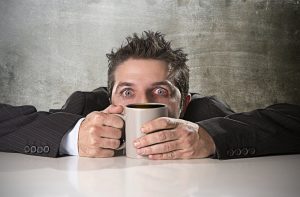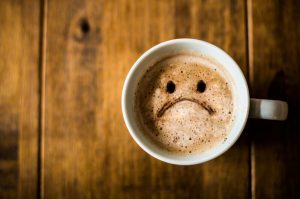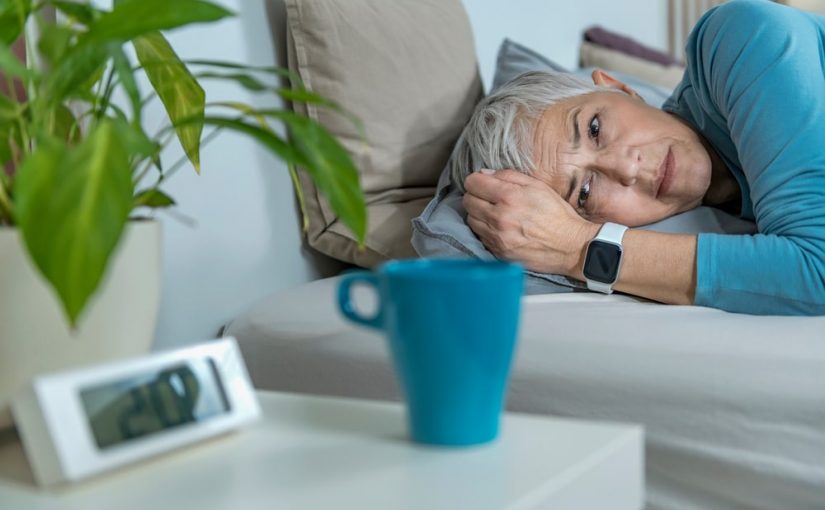Can Caffeine cause Anxiety?
Caffeine is a common and extensively used drug globally. 85% of the world’s population drinks at least one caffeinated beverage daily. But the question is, is it good for every person?
It is a central nervous system (CNS) stimulant. In excess, it may trigger signs of anxiety. It is a psychoactive drug that individuals commonly have all around the world. According to reports, caffeine is the second most ingested drink after water, at 1.6 billion cups daily.
A lot of individuals have caffeine to make them “awake” or to stay alert. But, an excess of might create a negative effect on an individual’s health. This might lead to various side effects, including signs of anxiety disorders. But, is it true to say “can caffeine cause anxiety?”
What is Anxiety?
It is a mental ailment in which individuals get feelings of fear and nervousness that restrict their daily routine. As per the National Institute of Mental Health (NIMH), it is estimated that 30% of adults suffer from an anxiety disorder at some point in their lives.
It is important to note that there is a huge difference between having a recognized anxiety disorder and experiencing a few signs similar to anxiety that might deteriorate with having coffee.
Read more to know about the association between anxiety and caffeine consumption, also the signs of anxiety, and how to have caffeine safely to minimize the risk of anxiety signs.
Caffeine and Anxiety:
Does caffeine cause anxiety? There is a link between it’s intake and mental health. The Diagnostic and Statistical Manual of Mental Disorders (DSM–5) presently lists 4 caffeine-associated ailments:
- Caffeine withdrawal
- Caffeine intoxication
- Indeterminate caffeine-associated disorder
- Other caffeine-induced problems such as anxiety or sleep disorder
How does caffeine cause anxiety? A research study determined how caffeine enhances attentiveness by inhibiting a brain chemical named adenosine. It makes a person feel fatigued, while simultaneously activating an adrenalin release that is found to enhance the levels of energy.
If there is a high quantity, these effects become stronger. And, this causes caffeine-induced anxiety. Also, there are mental benefits to caffeine, high doses are found to induce anxiety signs. Hence, individuals suffering from panic disorder or social anxiety disorder are particularly sensitive. This is known as anxiety caffeine sensitivity.
Another study stated that when consumed in excess, it may cause signs similar to psychiatric problems such as sleep and anxiety disorders, growing aggression, nervousness, and psychotic signs. So, the answer is a YES to “Does caffeine cause anxiety and depression?”
Signs of Caffeine-Induced Anxiety:

Signs of having an excess of caffeine can be drowsiness, nausea, headache, insomnia, dehydration, anxiety, fast heartbeat, and restlessness. While, the signs of anxiety are feelings of terror, fear, awkwardness, too much worry, restlessness, sweating, apprehension, and a fast heartbeat.
Its overuse may bring about signs of anxiety from caffeine. And, on the contrary, caffeine anxiety symptoms may worsen with the use of caffeine. If an individual is worried about his or her coffee intake, a discussion with a healthcare provider is a must.
Caffeine Withdrawal:
If a person is used to a regular intake of caffeine, and suddenly stops it, he or she may experience withdrawal signs including:
- Exhaustion
- Nervousness
- Miserable mood
- Headaches
- Convulsions
- Irritation
- Difficulty concentrating
Caffeine withdrawal is not thought to be risky similar to the withdrawal from opioids. However, it might be tough and upsetting. Consider speaking to the concerned doctor for recommendations on how to reduce it slowly and progressively. The ways of getting adequate sleep and exercise, and drinking more water.
However, people trying to cut back on caffeine can use several other remedies or tricks to reduce caffeine withdrawal headaches. Medicines that are available over the counter, such as ibuprofen, aspirin, and acetaminophen, contain compounds that block pain signals and ease most headaches.
Intake of caffeine within safe limits:

Research indicates that there are health benefits of moderate caffeine doses. A few of these benefits can be:
- Improved concentration
- Better athletic or work performance
- Improved fatigue
- Better mental alertness
- Weight loss
- Lower risk of chronic ailments like cancer, and Parkinson’s disease.
- Reduced risk of diabetes.
In 2012, the FDA dispensed certain directions stating that for healthy adults, caffeine intake below 400 mg per day is not related to adverse events.
Also, the study results established that for all ages combined, the average caffeine consumption from all drinks is 165 milligrams per day. This is roughly equal to the quantity of one to two cups of regular coffee.
The FDA, also stated that consumption of up to 400 mg of caffeine per day must not cause adverse events. This comes to be nearly three to four cups of coffee.
A few groups of individuals, those with medical problems, must discuss with their physicians how to determine whether caffeine is safe for them or not. These individuals include who:
- Are pregnant
- Are lactating
- Have anxiety
- Are children and teens
- Have sleeplessness problem
- Have chronic headaches or migraines
- Have an abnormal heart rate
- Have hypertension
- Consume various medicines such as antibiotics, stimulants, heart medicines, and asthma drugs.
Various health organizations have warned against the utility of caffeine in the above-stated populations. Of specific concern is the acceptance of energy beverages in young individuals, with high levels of both sugar and caffeine. Also, there are apprehensions about the effects of mixing alcohol and caffeine.
The greatest way to offer more evidence regarding the safe levels of caffeine intake requires to be determined. People must be aware of the caffeine content in various drinks. Reading the label properly and daily planning helps avoid the adverse outcomes of too much caffeine intake.
Individuals who wish to lower or limit their caffeine intake must do so progressively. This aids in avoiding signs like dizziness, nausea, headache, fatigue, irritation, trouble while concentrating, etc.
High Caffeine Beverages:
The caffeine content of drinks was assessed in a survey. The researchers classified them into numerous classes:
| Drink | Caffeine Content (mg/fluid ounce) |
| Espresso | 45-60 |
| Energy shots | 41-71 |
| Regular coffee | 5-20 |
| Energy drinks | 4-21 |
| Carbonated soft drinks, caffeinated, regular or diet | 3-8 |
| Tea, caffeinated, regular or diet | 2-10 |
| Decaffeinated coffee | 0.24 |
It is significant to note that there were restrictions in defining the quantity of caffeine in the drinks given in the above table.
The investigators note that while a majority of commercially available beverages have caffeine content stated on the label, for coffees and teas prepared to order, the content might differ extensively. The content of caffeine may be based upon the origin of the crop, it’s processing, and mode of preparation.
Caffeine Alternatives:
A lot of individuals depend on the blow of energy that caffeine offers them in the morning. This might, at times, accompany certain negative results. These can be developed or deteriorating anxiety signs. This is in other words, caffeine anxiety.
Decaffeinated tea or coffee might be a good option for a lot of individuals. These drinks are expected to have a similar flavor. Yet, they might not offer the energy boost that caffeine does.
Once an individual positively weans themselves from caffeine, on the other hand, this might be a calming choice. There is a massive range of herbal teas that are available in the market. They are well-accepted all over the globe and come with several health benefits.
A few individuals find that exercise may be a great way to begin the day. An outdoor walk or a jog on the treadmill indoors, might be an excellent way to get blood flowing and clear brain fog. Intake of water also helps in waking up people.
How to get rid of caffeine anxiety?
For a caffeine anxiety cure, it is necessary to follow the steps listed below. Any person’s coffee-associated anxieties and jitters would disappear. Also, the person would be able to enjoy his or her morning pick-me-up free of adverse effects.
Stop having caffeine as soon as you observe adverse effects:
If anyone observes unpleasant signs such as shakiness, stop having caffeine right away. Foods and drinks having caffeine are tea, coffee, soda, energy drinks, ice creams, dark chocolate, and desserts. Also, various performance-enhancing formulas such as pre-workout supplements might contain rich amounts of caffeine.
Stay Hydrated:
Water intake is vital for staying hydrated during the day. Many studies claim that drinking water assists to relieve caffeine-induced jitters. This might be because dehydration might worsen the signs. Hence, it might aid to enhance the water intake while a person waits for the caffeine to leave his or her system.
Moreover, if a person is not accustomed to caffeine, it might work as a mild diuretic and cause increased urination and recurrent stools.
Consume fiber-rich foods:
Consumption of fiber-containing foods might delay the release of caffeine into the bloodstream. People can choose slow-digesting, fiber-rich foods. These can be beans, whole grains, nuts, seeds, lentils, and starchy veggies.
Mitigating Stress:

Meditation for nearly 10 minutes in the morning is an excellent way of centering oneself before completely waking up. When a person is nice and calm before consuming coffee, he or she would be more focused and grounded.
Practice Deep Breathing:
If a person feels anxious, it is better to take slow, deep breaths for five minutes. Otherwise, practice meditation to calm the mind and nervous system.
Get moving:
It is best to go for a light walk to ease the feelings of anxiety and jitters.
How much caffeine is an excess?
As per the USFDA, 400 mg a day, which is around 4 cups of coffee, characteristically won’t cause negative or hazardous effects in healthy adults. Also, the FDA estimates that nearly 1,200 mg of caffeine may give rise to toxic effects like seizures.
While revising these figures, remember that there are varied differences in various individuals’ sensitivities to the caffeine effects and their metabolic rate as well. If a person consumes any medicines, they might also be affected by caffeine intake. Speak to the concerned physician in case of any concerns.
Summary:
There’s a relationship between intake of caffeine and anxiety including caffeine-induced anxiety disorder. However, for a majority of individuals, moderate caffeine consumption is considered safe and might exert benefits.
Reducing or cutting back caffeine from one’s diet rapidly may cause withdrawal signs, which might also produce anxiety. If a person feels that his or her anxiety is increasing because of having caffeine, discuss with the concerned doctor about the right amount.
FAQs:
Why does caffeine cause anxiety?
The jittery effects of caffeine on a person’s body are similar to those of a terrifying event. That’s due to the reason that caffeine stimulates the “fight or flight” response. And, as per studies, this may worsen anxiety and may even activate an anxiety attack.
Does too much caffeine cause anxiety?
A research study noted that too much intake of caffeine may bring about signs similar to psychiatric conditions such as anxiety, sleep problems, increasing anger, and other mental signs.
Does caffeine and alcohol cause anxiety?
Alcohol alters the levels of neurotransmitters such as serotonin present in the brain. And, this might deteriorate anxiety. A person might experience more feelings of anxiety after the effects of alcohol wear off. Alcohol-induced anxiety may persist for numerous hours, or even for a whole day after.
And, caffeine can be consumed in low doses. However, high doses may lead to disagreeable effects, like anxiety and uneasiness.
Does caffeine withdrawal cause anxiety?
Caffeine enhances blood pressure, heart rate, and stress hormones. However, quitting might exacerbate these same feelings. In the development of caffeine dependence, suddenly stopping the use of caffeine may trigger anxiety. Moreover, it may cause muscle tremors and even panic attacks in a few cases.
Does caffeine make anxiety worse?
High caffeine levels not only enhance anxiety and uneasiness, but also reduce the formation of serotonin (the feel-good chemical) in the body. And, this results in a depressed mood.
How long does caffeine anxiety last?
On the whole, the more caffeine a person is accustomed to having, the more serious the withdrawal signs are expected to be. The signs of withdrawal usually start 12 to 24 hours after the last caffeine consumption and may persist up to 2-9 days. Caffeine might be a helpful tool for a person who requires help while waking up and concentrating.

